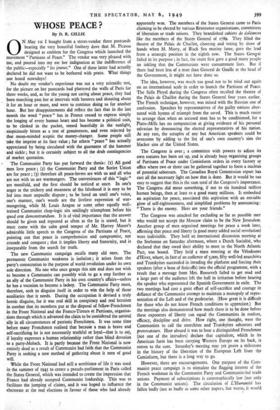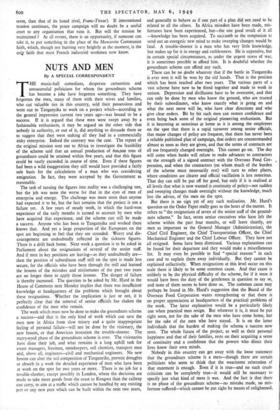WHOSE PEACE ?
By D. R. GILLIE ON May 1st I bought from a street-vendor three postcards bearing the very beautiful feathery dove that M. Picasso designed as emblem for the Congress which launched the movement " Partisans of Peace." The vendor was very pleased with me, and poured into my ear her indignation at the indifference of the public—especially "les jeunes." One of these latter had actually declared he did not want to be bothered with peace. What things one heard nowadays!
No doubt my vendor's experience was not a very scientific test,
for the picture on her postcards had plastered the walls of Paris for three weeks, and, as for the young not caring about peace, they had been marching past her at intervals with banners and shouting about it for an hour or more, and were to continue doing so for another hour. But her disappointments did reflect the fact that in the last month the word " peace " has in France ceased to express simply the longing of every human heart and has become a political coin, to be clinked in the pocket, tossed boastfully in the sunlight, suspiciously bitten as a test of genuineness, and even rejected by that mean-minded sceptic the money-changer. Some people still take the imprint at its face value ; for others " peace " has actually appreciated by being circulated with the guarantee of the hammer and sickle ; but it is certainly subject to all the drab contingencies of market quotation.
The Communist Party has put forward the thesis : (1) All good men love peace ; (2) the Communist Party and the Soviet Union are for peace ; (3) therefore all peace-lovers are with us and all who are not with us are warmongers. The conveniences of this " logic" are manifold, and the first should be noticed at once. In one's anger at the trickery and meanness of the falsehood it is easy to be led into most unpacific dispute ; to be lured on until one's voice, one's manner, one's words are the liveliest expression of war- mongering, while M. Louis Aragon or some other equally well- trained Communist chop-logic sits smilingly triumphant before his quod eras demonstrandum. It is of vital importance that the answer should be given and repeated as often as the lie is stated, but it must come with the calm good temper of Mr. Harvey Moore's admirable little speech to the Congress of the Partisans of Peace, pointing out that peace is comprehension and compromise, not crusade and conquest ; that it implies liberty and fraternity, and is inseparable from the search for truth.
The new Communist campaign recalls many old ones. The permanent Communist weakness is isolation; it arises from the party's consecration to the purpose of world revolution under its own sole direction. No one who once grasps this aim and does not wish to become a Communist can possibly wish to go a step further as an ally of the Communist Party in his own country's affairs—unless he has a vocation to become a lackey. The Communist Party must, therefore, seek to disguise itself in order to win the help of those auxiliaries that it needs. During the occupation it devised a truly heroic disguise, for it was real skill in conspiracy and real heroism in combat that its members put at the disposal of fellow-Frenchmen in the Front National and the Francs-Tireurs et Partisans, organisa- tions through which it advanced the claim to be considered the natural ally in all circumstances of patriotic Frenchmen. It was some time before many Frenchmen realised that because a man is brave and self-sacrificing he is not necessarily truthful or loyal—that is to say, if loyalty expresses a human relationship rather than blind devotion to a party-Moloch. It is partly because the Front National is now entirely dead as a result of Communist bad faith that the Communist Party is seeking a new method of gathering about it men of good will.
While the Front National had still a semblance of life it was used
in the summer of 1945 to create a pseudo-parliament in Paris called the States General, which was intended to create the impression that France had already accepted Communist leadership. This was to facilitate the jumping of claims, and it was hoped to influence the electorate at the real elections in favour of those who had already apparently won. The members of the States General came to Paris claiming to be elected by various Resistance organisations, committees of liberation or trade unions. They brandished cahiers de doleances like the members of the States General of 1789. They filled the theatre of the Palais de Chaillot, cheering and voting by show of hands when M. Marty, of Black Sea mutiny fame, gave the lead from a strategic position in the eighth row. The States General failed in its purpose ; in fact, the stunt first gave a good many people an inkling that the Communists were consummate liars. But if there had been less of a man than General de Gaulle at the head of the Government, it might not have done so.
The idea, however, was much too good not to be tried out again on an international scale in order to launch the Partisans of Peace. The Salle Pleyel during the Congress often recalled the theatre of the Palais de Chaillot during the States General four years earlier. The French technique, however, was mixed with the Russian one of confession. Speeches by representatives of the guilty nations alter- nated with hymns of triumph from the saved. This is much easier to arrange than when an accused man has to be conditioned, for a Plaits-Mills has no compunction at giving evidence of his personal salvation by denouncing the elected representatives of his nation. At any rate, the scruples of any but American speakers could be overcome by adding to the list of one's own country's sins the blacker sins of the United States.
The Congress is over ; a committee with powers to adjust its own statutes has been set up, and is already busy organising groups of Partisans of Peace under Cominform orders in every factory or office where two or three can be gathered together to form a nucleus of potential saboteurs. The Canadian Royal Commission report has cast all the necessary light on how that is done. But it would be too easy to suggest that this is the sum total of the Congress's importance. The Congress did mean something, if not to six hundred million human beings, then at least to a good many millions. It embodied an aspiration for peace, associated this aspiration with an enviable glow of self-righteousness, and simplified problems by announcing : " There is the enemy. Here are your friends."
The Congress was attacked for excluding as far as possible mer who would not accept the Moscow claim to be the New Jerusalem. Another group of men organised meetings for peace a week later, affirming that peace and liberty (a good many added social revolution) were indivisible. They held an international discussion meeting at the Sorbonne on Saturday afternoon, where a Dutch Socialist, who declared that they owed their ability to meet to the North Atlantic Pact, was booed. They held a mass meeting at the Velodrome d'Hiver, where, in face of an audience of 5,000, fifty well-led anarchists and Trotskyites succeeded in invading the platform and forcing their speakers (after a bout of fisticuffs) into the official programme, with a result that a message from Mrs. Roosevelt failed to get read and a large part of the audience left the hall in irritation before hearing the speaker who represented the Spanish Government in exile. The two meetings had cost a great effort of self-sacrifice and courage in defiance of the Communist attempt to maintain a monopoly of repre- sentation of the Left and of the proletariat. (How great it is difficult for those who do not know French conditions to appreciate.) But the meetings also demonstrated how much there is to be done before these exponents of liberty can equal the Communists in realism, efficacy, discipline and drive. How right, one thought, were the Communists to call the anarchists and Trotskyites saboteurs and provocateurs. How absurd it was to hear a distinguished Frenchman (not one of the intruders) declare that capitalism, which in its American form has been carrying Western Europe on its back, is rotten to the core. Saturday's meeting may yet prove a milestone in the history of the liberation of the European Left from tl4e Cominform, but there is a long way to go.
However, there are encouragements. One purpose of the Com- munist peace campaign is to stimulate the flagging interest of the French workman in the Communist Party and Communist-led trade unions. Payment of subscriptions is catastrophically low (not only in the Communist unions). The circulation of L'Humanite has fallen badly (not as badly as some other papers, but worse, it would
seem, than that of its hated rival, Franc-Tireur). If international tension continues, the peace campaign will no doubt be a useful asset to any organisation that runs it. But will the tension be maintained ? At all events, there is an opportunity, if someone can take it, to put something in the place of the Muscovite Communist faith, which, though not burning very brightly at the moment, is the only faith that most French industrial workmen now know.







































 Previous page
Previous page